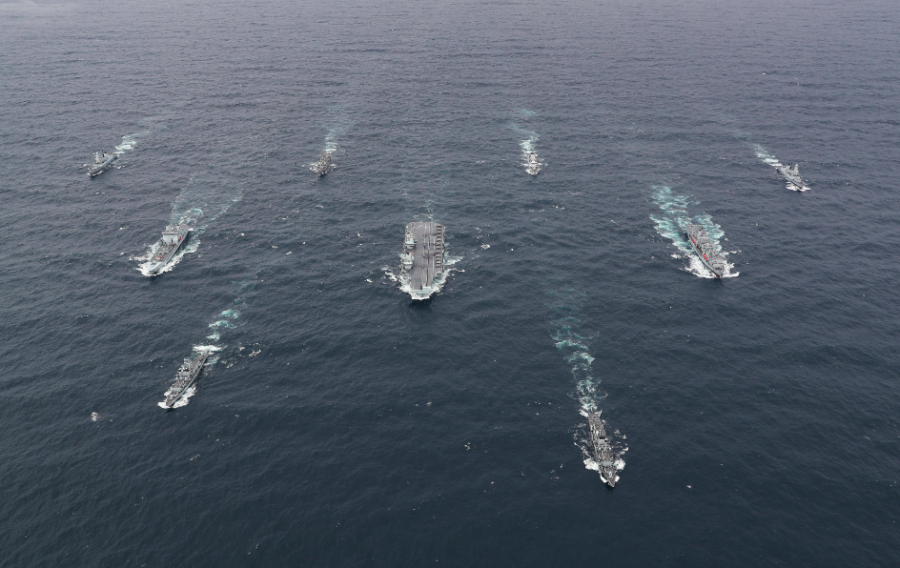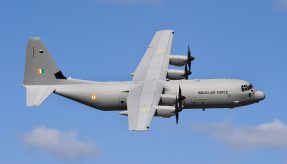
The largest concentration of maritime and air power to the UK in a generation will set sail next month, visiting more than 40 countries.
The UK Carrier Strike Group’s globe-spanning maiden deployment will feature visits to India, Japan, Republic of Korea and Singapore, Defence Secretary Ben Wallace has announced.
Mr Wallace set out to Parliament the formidable size of the UK Carrier Strike Group, which will be led by new aircraft carrier HMS Queen Elizabeth.
On a 28-week deployment spanning 26,000 nautical miles, the Carrier Strike Group will conduct engagements with Singapore, the Republic of Korea, Japan and India as part of the UK’s tilt towards the Indo-Pacific region. Units from the Carrier Strike Group are expected to visit more than 40 countries and undertake over 70 engagements.
Mr Wallace said: “When our Carrier Strike Group sets sail next month, it will be flying the flag for Global Britain – projecting our influence, signalling our power, engaging with our friends and reaffirming our commitment to addressing the security challenges of today and tomorrow.
“The entire nation can be proud of the dedicated men and women who for more than six months will demonstrate to the world that the UK is not stepping back but sailing forth to play an active role in shaping the international system of the 21st Century.”
HMS Queen Elizabeth, the most powerful surface vessel in the Royal Navy’s history, will next month set sail as the flagship of a Carrier Strike Group. Joining her will be a surface fleet of Type 45 destroyers, HMS Defender and HMS Diamond, Type 23 anti-submarine frigates HMS Kent and HMS Richmond, and the Royal Fleet Auxiliary’s RFA Fort Victoria and RFA Tidespring.
Deep below the surface, a Royal Navy Astute-class submarine will be deployed in support, armed with Tomahawk cruise missiles.
Providing a cutting edge on the carrier’s flight deck will be eight state-of-the-art RAF F-35B Lightning II fast jets. Alongside will be four Wildcat maritime attack helicopters, seven Merlin Mk2 anti-submarine helicopters and three Merlin Mk4 commando helicopters – the greatest quantity of helicopters assigned to a single UK Task Group in a decade.
And supporting below deck will be a company of Royal Marines Commandos.
A US Navy destroyer, a frigate from the Netherlands and a squadron of US Marine Corps F-35B jets are also fully integrated.
Indo-Pacific tilt
CSG21 will be a truly global deployment, from the North Atlantic to the Indo-Pacific. The Defence Secretary explained how it will help achieve the UK’s goal for deeper engagement in the Indo-Pacific region in support of shared prosperity and regional stability – a stated aim of the Government’s recently published Integrated Review into foreign, defence, security and development policy.
The forthcoming deployment will bolster already deep defence partnerships in the region, where the UK is committed to a more enduring regional defence and security presence. Ships from the Carrier Strike Group will participate in Exercise Bersama Lima to mark the 50th anniversary of the Five Powers Defence Agreement between Malaysia, Singapore, Australia, New Zealand and the United Kingdom.
Engagements in Singapore, the Republic of Korea, Japan and India will provide the opportunity for strengthening our security relationships, tightening political ties and supporting our UK exports and International Trade agenda.
Sailing alongside Allies and partners
The Carrier deployment will take integration with NATO allies and other global Allies to a new level.
At the forefront will be the US and the Netherlands. Sailing as part of the Group and providing it with air defence and anti-submarine capabilities will be the Arleigh Burke-class destroyer USS THE SULLIVANS. Flying alongside their UK counterparts will be a squadron of 10 US Marine Corps F-35B Lightning II aircraft. Providing further air defence will be the Royal Netherlands Navy’s frigate HNLMS Evertsen.
On the Mediterranean leg of the deployment, another close NATO Ally will provide a period of dual carrier operations when French Aircraft Carrier Charles De Gaulle sails alongside HMS Queen Elizabeth.
Elsewhere air and maritime forces from Australia, Canada, Denmark, Greece, Israel, India, Italy, Japan, New Zealand, Oman, the Republic of Korea, Turkey and the UAE will operate alongside the Carrier Strike Group.
Units from the group visit more than 40 countries and undertake in excess of 70 engagements, visits, air exercises and operations.
Leading in NATO
The UK Carrier Strike Group will be NATO’s first 5th generation Carrier Strike Group, underlining the UK’s leading role in the Alliance.
CSG21 will participate in NATO exercises such as Exercise Steadfast Defender, and provide support to NATO Operation Sea Guardian and maritime security operations in the Black Sea.
image © Crown Copyright
If you would like to join our community and read more articles like this then please click here







